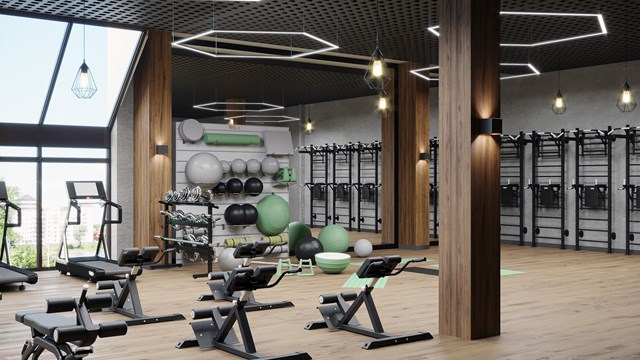One thing denizens of condominiums and cooperatives alike agree on is amenities; they just gotta have them. The more the merrier even. But while celebrated luxuries like pools or mainstays like lobbies are unlikely to ever fall out of favor, certain perks lose their luster as newer and shinier options come along. Others still evolve, whether gradually or rapidly, until they seldom resemble their original forms or functions. In the world of amenities, everything is fluid and nothing is forever.
Yesterday's News?
Some amenities reach a point where they're no longer practical, or economically feasible, or viable given a superior alternative, or just wanted anymore. It's survival of the fittest in residential real estate, and certain popular options are currently teetering on the brink of irrelevance.
Paul Gottsegen, the president of Halstead Management Company in New York, is quick to list refrigerated storage rooms for grocery deliveries as one such feature. Apparently, these are no longer being installed in new developments, as Fresh Direct and similar vendors offer their customers much more precise delivery windows, thus enabling unit owners to have their food delivered precisely when necessary. This eliminates the need to have various residents' orders cooling in a shared space upon their arrivals home.
Perhaps more surprisingly, alternatives are starting to emerge that may threaten the role of the trusty doorman. “Not every building has a 24-hour doorman or concierge on duty,” says Alex K. Kuffel, president of Pride Management Corp., in Manhattan. “Virtual doorman systems are on the rise, because they enable residents to receive essential notifications anywhere, anytime and by various means, while also providing a security tracking system with long-term documentation.”
While some may scoff that the replacement of an actual human person for a digital program that is centered somewhere off-premises (potentially even out of state) removes a certain personal touch, it may actually give an association an opportunity to explore other useful options. “We've replaced the doormen in some buildings with porters,” notes Abdullah Fersen, CEO of Newgent Property Management in Yonkers. “It's less costly than a full-time doorman, and, with the virtual doorman in place, these part-time porters are free to to move about the building, helping owners move things, or do repairs, or assist with lost keys.” Fersen reveals that one property that underwent this human doorman-to-virtual doorman/porter transition went from paying $96,000 per year to only $45,000 for the retooled setup.
And while less likely to be discarded en masse, some properties are doing away with their lounge areas. “Many properties used to have 'card rooms' or 'sofa roofs,' where people would have birthday parties or play poker or Scrabble, but some of those are becoming converted into fitness rooms, as there's much less demand for that type of game-oriented common area,” says Stephen Elbaz, founder & president of Esquire Management Corporation in Brooklyn. “I had a property wherein they converted their lounge into a spin room, bringing in five or six bikes so they could work out on their own, or bring in an instructor once a week or so to hold a formal class.”
That said, Peter von Simson, CEO of New Bedford Management in Manhattan, has seen even gyms grown less favorable over time. “We seem to get far fewer requests for people to sign up,” he says. “There are groups of people in each building that use their gym every day, but we are asked about gyms less and seem to process less gym waivers.”
Email Everywhere
Other amenities are staying put but are evolving with the era out of necessity. A major impetus for this is everyone's increasing need to be online all of the time.
In properties where lounges are still en vogue, wi-fi access is paramount. Some are even veering away from a social aesthetic to more of a communal work space, 'WeWork'-style vibe. But the desire for device-based convenience doesn't end there; it has permeated laundry rooms as well. “Many of them have wireless now, making it easier for people to get things done while they wait for their clothes,” says Elbaz. “Several buildings are actually adding workstations with computers that people can sit down and use while they wait.”
Laundry List
While the laundry room remains a mainstay, people are beginning to seek out alternatives to this long-standing amenity as well.
“People are more frequently preferring to own a washer and dryer inside their unit, simply due to convenience, when possible,” says Kuffel. “Some newer buildings are starting to include laundry rooms or alcoves within the apartments. And buildings that do not allow residents to install their own laundry equipment are upgrading their facilities with larger, user-friendly commercial machines that are smart card-operated.”
Other buildings are offering drop-off services that owners are taking to. “We use a mom-and-pop local service that takes both machine wash and dry cleaning from the building and returns it clean, with only a negligible uptick in cost compared to taking it to a location or doing it in-house,” says Fersen. “And as it's a neighborhood business, owners can call the vendor personally, versus a larger, national service.”
The Roof Is on Fire
Finally, rooftops – access to which was once a huge premium in and of itself – are starting to feature more bells and whistles.
“Gone are the days when a resident would sit in a portable beach chair on a black asphalt roof to get some sun,” says Kuffel. “Roof deck gardens are in demand. Many are beautifully conceived with attractive trees and plantings, an irrigation system, nighttime lighting, comfortable furnishings and security cameras. Often, there will be a springtime gathering or a summer social event that encourages a communal family environment for a building's residents.”
Amenities may not change with the seasons, but these are wild and unpredictable times. With some luxury buildings offering things like virtual golf, doggy day care or a resident chef, whom among real estate speculators can predict what the next few years will bring?
Mike Odenthal is a staff writer at The Cooperator.







Leave a Comment